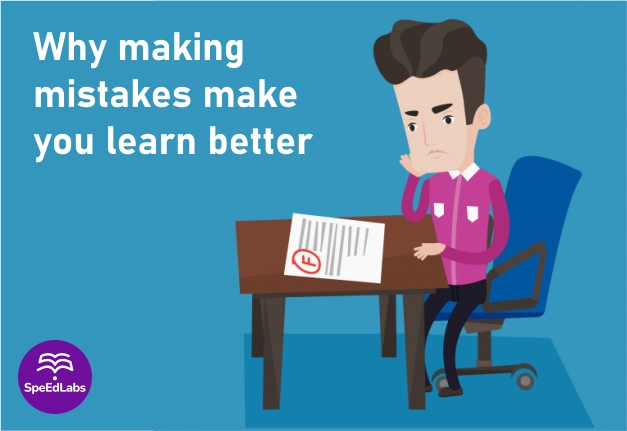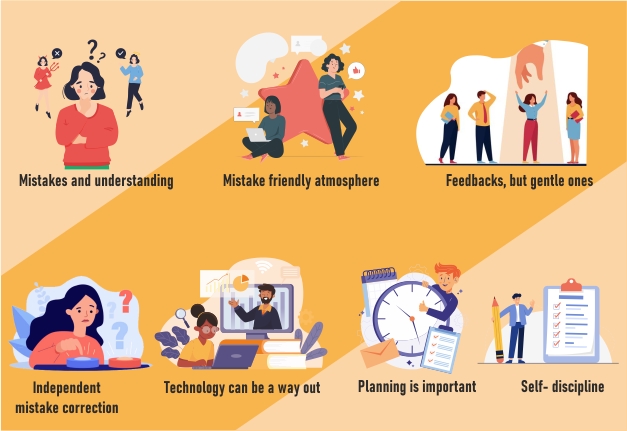“Mistakes make you learn better” It is a popular belief that learning can be mastered only when we make fewer mistakes.
Contrary to popular belief, when a person makes a mistake while learning, it improves their memory for the right information. Even if a person makes a mistake while testing themselves, as long as their error is close to the right answer, they’re more likely to remember the right information.
Different ways in which making mistakes make you learn better
Instead of giving up in frustration after making a mistake, we work constructively to understand the mistake. The strategy to solve the problem stays with us better than if we just memorize the solution. We try to work logically to find the solution to the problem after making mistakes. Despite this, in our educational system, mistakes are more often punished than seen as an opportunity and a constructive way to learn. Before you can learn from your mistakes, you have to accept full responsibility for your role in the outcome. That can be uncomfortable sometimes, but until you can say, “I messed up,” you aren’t ready to change.
1. Mistakes and understanding
When students are mindful of incorrect solution concepts while working on a problem, they are able to deal with the problem at a much deeper level than someone who is just presented with the correct solution and has to memorize it. Also, we should not just correct a mistake but make sure that students recognize and understand the reason for the mistake. Only in this way can students arrive at a deeper understanding and correct solution method for the mistake.
2. Mistake friendly atmosphere
If students are to be allowed to learn from their mistakes, they must be allowed to make them! It should be clear to students that in a learning situation mistakes will be handled in a different way than in a performance evaluation where every mistake has a negative consequence. Also, help to create a mistake-friendly learning atmosphere where students don’t feel ashamed of their mistakes.
3. Feedbacks, but gentle ones
If a problem with understanding is recognized late in the learning process and a lot of time has elapsed before the student discovers they must re-learn the topic, the incorrect thought processes may be firmly cemented in the student’s mind. The learning process usually follows these steps in this order: practice activities, make errors, get feedback, think over the feedback, and try again. The less this process is interrupted the more efficient and effective the learning is.
4. Independent mistake correction
Giving students the opportunity to find and correct their mistakes on their own immediately after they are made has a positive impact on their motivation to learn. At the same time, learning to look for root causes and sources of mistakes develops conceptual understanding.
For example, in mathematics, students often just learn solution methods for problems by rote rather than actually understanding the concept. However, when students look for the source of mistakes on their own, they realize the cause and improve their understanding independently.
5. Technology can be a way out
We quickly reach our limits when we try to do justice to all the mistakes of all our students. Educational software can give some relief if it is able to analyze everything the student enters and give them direct feedback on their answer. In turn, you as the teacher should automatically get analyses on the strengths and weaknesses of your students.
One example of such platform can be Speedlabs.in
It provides personalized learning and students can learn independent mistake correction through this.
6. Planning is important
Beating yourself up for your mistakes won’t help you down the road. It’s important to spend the bulk of your time thinking about how to do better in the future.
Make a plan that will help you avoid making a similar mistake. Be as detailed as possible but remain flexible since your plan may need to change.
Whether you find an accountability partner or you track your progress on a calendar, find a way to hold yourself accountable. Keep in mind that what works for one person might not work with someone else.
7. Self-Discipline
Sometimes, it only takes one weak moment to indulge in something you shouldn’t. Creating a list of all the reasons why you should stay on track could help you stay self-disciplined, even during the toughest times.
After you get over the disappointment of making a mistake in the first place, the next step is to home in on why you made it. That’s the learning opportunity. The ability to reflect on choices, successes and failures is critical to a growing child’s ability to make decisions that will lead to a bright future both personally and professionally. Some of the world’s leading figures encountered huge stumbling blocks on the road to fame and glory, but used these to refine their strategies and come up with a plan that would eventually see them arriving safely at their desired destination.
Just imagine if Thomas Edison was afraid of making mistakes, you would be sitting in a dark room with candles!
making mistakes make you learn better. making mistakes make you learn better. making mistakes make you learn better. making mistakes make you learn better. making mistakes make you learn better.
Also published on Medium.

